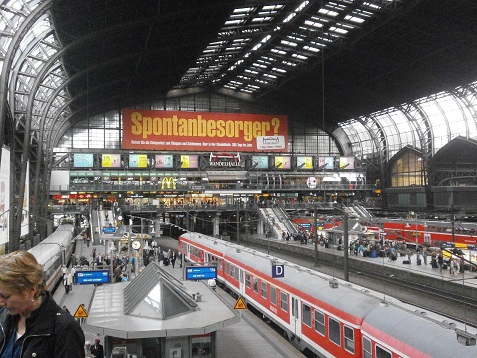Corps de l’article
Europe’s conservatism and nationalist fallback has ended up in begetting its opposite. Will the Syrian refugees exodus result in the policy shift that is necessary lest Europe becomes against its own will the last resort of persecuted populations ? Now, billions of euros are going to be spent in emergency relief, belatedly vindicating those who denounced for a long time our policies excessive insistence on strengthening immigration controls at the Schengen borders. It had become unavoidable that a discourse emphasizing at the same time the democratization of the regions adjacent to the European Union and our inability to influence on the Syrian situation, this together with our de facto blockading threatened populations into an endless Lybian or Turkish exile, would explode on account of its own contradictions. There has been no dearth of " co-development " rhetoric but generally speaking Europe does not do enough, by far, to support independent initiatives in its neighborhood or to facilitate transborder projects set up by european residents coming " from other parts of the world ". There is nothing outrageous in stating that Europe no longer has borders : it never had anyway. Its expansion blanketed the world in such a way that globalization directly impinges on the relationship between Europe and all the people in its neighborhood – and this not solely in terms of free trade associations or agreements regarding the defense of its official, external borders.
And as mobilities are on the rise
In our conversations with Niels Planel[1], who recently published extensively about his time with international organizations, most notably with the World Bank, we reckon that macro-economic measures are not enough. They must go together with support for out-of-the-box initiatives by entities which take risks and make a stand – granting scholarships, making micro-credits available, and generally providing incentives at the local level. All this in the realm of the urban, where now a majority of the people reside. These days students are massively on the move. Expertise now follows production in the outsourcing and delocalisation game, and shift to wherever labor power is abundant and an effective demand exist. Diaspora communities spearhead development at home and their members function as intercultural mediators engaging on daily basis in the interchange between cultures and ways of life. For sure, there is a need to make a distinction between voluntary mobility and forced exile, but mobility itself is simply an irreversible feature of our times, and we should actively fostering it lest we make ourselves unable to anticipate collective developments and face, every time again, the tragedies of emergency situations.
Fig. 1
The striking connection between the rise of religious fundamentalisms and the growing self-closure of the societies harboring them has its counterpart the distrust of foreigners actually growing with the spread of national identity ideologies. As if Europe, which historically has been built on intermingling of populations of diverse origins would suddenly be threatened by a potential extra one percent of people originating from its margins. How did we reach a situation where French CEO’s and the German economy minister have to come to the fore to explain that Europe’s demographic deficit poses a far graver risk to our societies than accepting immigrants ? The time-line running from the Tunisian revolution to the current wave of Syrian refugees compels Europe to redefine its policies and put them in accordance with its man-faceted calling – which overlaps with, but also largely exceeds, its economic game plan. Failing to which Europe will become ossified and senile, falling prey to repugnant xenophobic creeds.
What was it then that was so hard to predict ?
The Great European Illusion was to believe that a single mode of operation would be applicable to the regulation of financial investments, international relations, and social policies. That package came down to prioritizing deals with China and the United States with regard to industrial, commercial and financial affairs, while basically leaving " the market " take care of all the rest. This set-up resulted in the outsourcing any response to open crises to the humanitarian sector. Hence the recurring " shock " every time a friendly dictator declined to follow our advice to exercise restraint, lost their self-control – or any kind of control at all. Shock at the Ukrainian revolution, for instance, while wondering how to address a democratic upheaval, staged in Europe’s name by a European nation [2] ?
In the end, our futile efforts to control our borders by maintaining friendly relations with dictatorships shaped the circumstances for (exactly) the situation we did not want. Yet, Nassim Nicholas Taleb had clearly made the point in his book The Black Swan [3] that it is essential to devise ways to alley risks relating to the occurrence of devastating events, even if the probability of such events arising is deemed marginal. Taleb internalized this attitude as part of his job as corporate risk manager, but he actually acquired it much earlier, overcoming fear while growing up in Lebanon torn by a bloody civil war. is relying cry : if you want to be safe, expect the unexpected[4]. This is precisely where European policies are a failure. Betting on the status quo to endure means to be bound to react too late. Our diplomats expressed astonishment at the fall of Ben Ali in Tunisia or Mubarak in Egypt. At that time, we asked Milad Doueihi for his opinion, and he gave us superior interpretations of event – still holding truth today[5]. And meanwhile the Lybian ruler Muammar Ghaddafi had quietly let known to those who wished for his downfall that it would not remain without direct consequences for Europe. And by now, Europe’s inability to anticipate the consequences of its diplomatic posture has resulted in a tragic outcome regarding the destiny of millions of people. Those who were arguing in terms of instituting democracy by way of foreign armed intervention may well now mull over Claude Lanzmann’s opposition to the Lybia war, expounded in a Le Monde op-ed[6]. Meanwhile in Syria, Russia’s and Iran’s support for the Assad regime makes such an approach totally unthinkable, leaving the situation without issue, and quick-started in an unprecedented humanitarian catastrophe. A complete national community is on the run now, and not a shard of a solution appears within sight. Whole chunks of Syrian territory are now in hands of the region’s most fanatical gangs.
The generalized floundering of dictatorships, whether religious or secular, exposes our societies unpreparedness in face of the world to come. It is the joint outcome of the movement of people and informations, of the power of dogmatic and repressive religious factions, and lastly, of the failure of foreign interventions to establish a just political order. Many Muslim intellectuals – e.g. the highly respected, late Abdelwahab Meddeb – have challenged Europe to come forward with a cultural alternative for muslims the world over, based on mutual respect and tolerance, and which would make it possible for Islam to revive its original diversity. The French review Les Temps Modernes, in a recent issue titled " God, Islam, and the State[7] " tried to formulate why Muslim states find it so difficult to formula pluralist political practices.
Cosmopolitism as a citizenship project
" Europe with a history –or without one ? " This was the title of our introductory chapter in our book " Europe, a broken mirror ", just after the defeat of the " Yes " vote at the referendum Jacques Chirac had called about the European constitution[8]. That was ten years ago. Besides the lack of popularity of a president at the close of his last term, the debate was also vitiated by dissentions, on the Left, between social democrats and opponents of globalization, and on the Right, between liberals and " sovereignists " (proponents of national sovereignty). Yet, and whatever were their reasons for their rejection, all Europeans, in all countries, were primarily concerned with the quality of their individual lives, and tossed out on thousands of volunteers the burden of conscience that is to wish for an opening up of the borders, international solidarity, a welcome for refugees and the sharing of wealth and resources. To these " idealists ", " realists " objected that all " integration policies " up to now had been a failure – in the words uttered by Angela Merkel on October 17, 2010[9]. More generally, Europeans were looking forward to a century where their individual well-being would be vouchsafed by universal access to higher education and a host of various rent-related incomes – varying from old age pensions to life insurance policies and the secure handing down of real estate from one generation to the next. With as corollary the emergence of a " residential economy " where " Northerners ", like Britons and Germans would happily spend their tourist money in the countries of the South. Now solve this puzzle : in a world becoming more mobile by the day, with an ever increasing intensity of commercial exchanges, can Europeans really afford to do as if co-existence with other people is simply a non-issue ?
Fig. 2
The Tunisian revolution clearly demonstrated that Europe’s borders are not the same as those of the European Union. " Multiculturalism " is a fact of life, and exchanges, commercial or otherwise, between continents are our future. The alleged failure of multiculturalism means in reality the collapse of ideologies promoting withdrawal. January 2015 saw many Muslim women at the big marches honoring the Charlie Hebdo editorial board[10]. They too were protesting against religious ideologies. And if Germany now declares it will take up to half a million refugees, it does not do so to bolster its demography or economy, nor is it as the result of a sudden " human-rightist " flash of insight[11]. It was compelled to do so because of the bankruptcy of policies of which the European Border Agency FRONTEX is the symbol. Can Europe afford to let thousands of refugees die at its borders ? Is it feasible to sort out people who have left everything behind to seek a refuge and a better future ? Will the current emergency redefine European political options ? At any rate, the summer of 2015 will definitely constitute a point of no return.
Never have economic growth and increase in wealth been so blatant. This can only result in those excluded from the feast trying to move on by all means possible. And the more so if they feel threatened by their own governments or by fanatical, violent sects. But then it might be useful to ponder Hannah Arendt’s warning to the effect that only citizenship holders are entitled to protection under Human Rights treaties. Seen in this light, to the issue of material support to refugees is added the necessity to provide them with social rights and with a European citizenship facilitating their future endeavors – including retention of their linkages with their regions of origin whenever possible. Failing to which one can expect even more xenophobic reactions to express themselves in the coming months. Real solidarity must happen if we don’t want to end up with ghettos coming up here, there – and everywhere.
The urgency to aid the Syrian refugees bears testimony to the necessity to alter European decision-making criteria, since it is no longer possible to define strategies as a prop of some win-win scenarios. To support only what appears guaranteed to succeed actually reduces any possibility of other, parallel avenues of success to emerge, outcomes of sometimes unfortunate experiences, but which have in them the seed of later positive advances insofar as well-targeted assistance has been adequately provided in time. Such policies would provide for a by far better probabilities in matters of emergency prevention.
Fig. 3
Niels Planel, in his plea for an updated cosmopolitism, pointed to a few avenues humanity could follow in order to overcome the negative issues associated with national borders. How could we longer accept a world ruled by the short term electoral considerations of the members of the U.S. Congress or Senate, many of whom do not even possess a passport ? How could we acquiesce to a new carving up of Africa according to the interests of multinational conglomerates or to China’s relentless hunger for resources it does not have at home ? For Europe, globalization must become a political project and no longer merely a liberal economic one. For us, human dignity remains a non-negotiable absolute, with the Syrian tragedy proving once more that issues of culture and of justice take precedence over figuring out how to achieve economic success.
Let’s pursue our reflection on these matters.
Parties annexes
Notes
-
[1]
Un autre souffle au monde. Fragments d’un itinéraire engagé . Review by this author (in French) :here.
-
[2]
Penser l’Ukraine après Maïdan , numéro 17/18. In order to safeguard access to Russian gaz, keep friendly relations and keeping Russia’s nuisance factor at bay, French president Francois Hollande declares himself pleased with the quiet on the east Ukrainian front, even if Ukraine is on the verge of default, and the UN has acknowledged a Russian (military) presence in that country, just as in Syria.
-
[3]
The Black Swan : The Impact of the Highly. See also : Black swan theory.
-
[4]
Incidentally, this is also the Indian Public Works Department’s highway billboards favorite catchphrase (note by translator).
-
[5]
Milad Doueihi. In February 2011 he pointed out the gap between what happened in the " Arab streets " and its (non) perception in Europe, in May he warned that the window of opportunity’ was closing fast, and that the still standing dictatorships would try to stave any form of destabilizing intervention.
- [6]
-
[7]
Les Temps Modernes , n ° 683. (April-June 2015). Anoush Gaanjipour’s article " L’islam : quelle théologie, quelle politique ? " is particularly enlightening in that respect, as he deconstructs why uninformed observers are so surprised about the blend of dogmatism and opportunism often encountered in islamist politics.
- [8]
- [9]
- [10]
-
[11]
German opinion is split. Even as more than a third of those surveyed think that their government is not doing enough to help refugees, 27 % think the opposite, and a large majority stresses there is a difference between refugees and immigrants. Even if it is too early to extrapolate current trends into the future, it is clear that the authorities in Europe will have to adjust their apparatus of governance in order to facilitate the newcomers’ integration. [Meanwhile, in the short span between this article publication in French and its translation in English, both the numbers and the situation on the ground have darkened considerably in Germany : See here (note by translator)].
Liste des figures
Fig. 1
Fig. 2
Fig. 3





